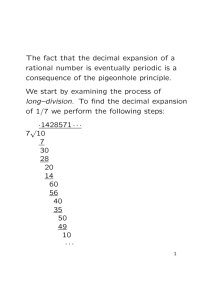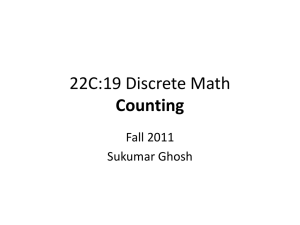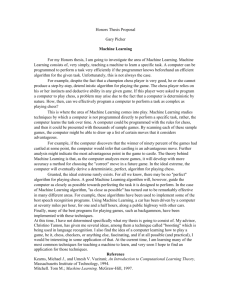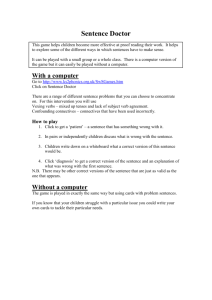Spring 07 Math 510 HW Solution I
advertisement
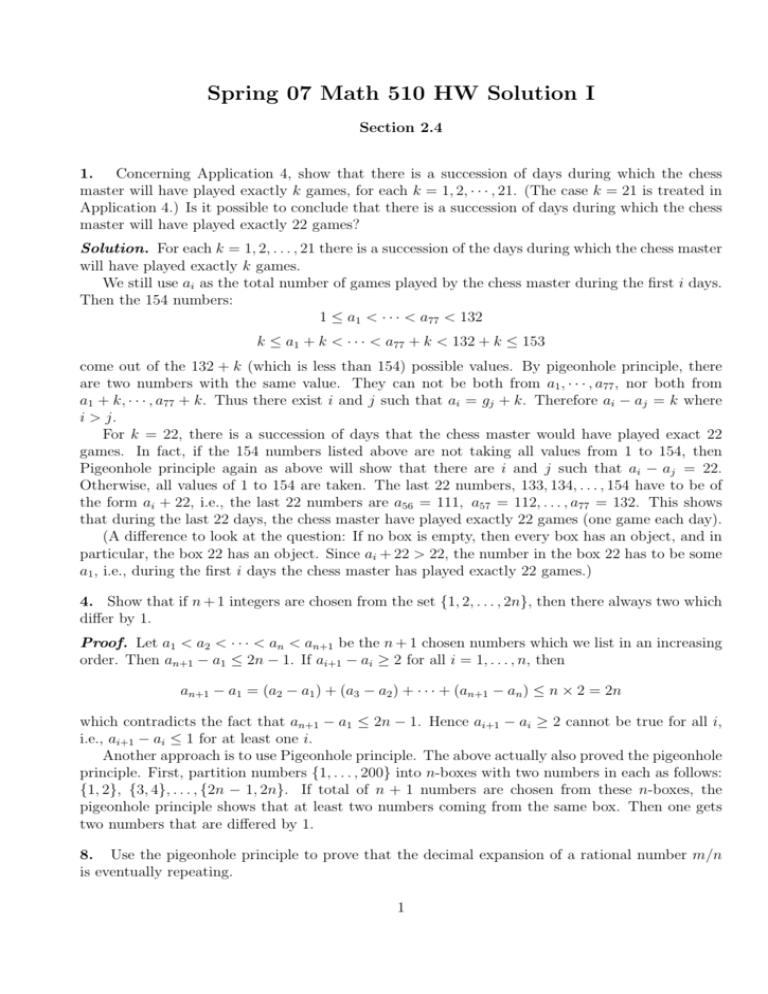
Spring 07 Math 510 HW Solution I
Section 2.4
1. Concerning Application 4, show that there is a succession of days during which the chess
master will have played exactly k games, for each k = 1, 2, · · · , 21. (The case k = 21 is treated in
Application 4.) Is it possible to conclude that there is a succession of days during which the chess
master will have played exactly 22 games?
Solution. For each k = 1, 2, . . . , 21 there is a succession of the days during which the chess master
will have played exactly k games.
We still use ai as the total number of games played by the chess master during the first i days.
Then the 154 numbers:
1 ≤ a1 < · · · < a77 < 132
k ≤ a1 + k < · · · < a77 + k < 132 + k ≤ 153
come out of the 132 + k (which is less than 154) possible values. By pigeonhole principle, there
are two numbers with the same value. They can not be both from a1 , · · · , a77 , nor both from
a1 + k, · · · , a77 + k. Thus there exist i and j such that ai = gj + k. Therefore ai − aj = k where
i > j.
For k = 22, there is a succession of days that the chess master would have played exact 22
games. In fact, if the 154 numbers listed above are not taking all values from 1 to 154, then
Pigeonhole principle again as above will show that there are i and j such that ai − aj = 22.
Otherwise, all values of 1 to 154 are taken. The last 22 numbers, 133, 134, . . . , 154 have to be of
the form ai + 22, i.e., the last 22 numbers are a56 = 111, a57 = 112, . . . , a77 = 132. This shows
that during the last 22 days, the chess master have played exactly 22 games (one game each day).
(A difference to look at the question: If no box is empty, then every box has an object, and in
particular, the box 22 has an object. Since ai + 22 > 22, the number in the box 22 has to be some
a1 , i.e., during the first i days the chess master has played exactly 22 games.)
4. Show that if n + 1 integers are chosen from the set {1, 2, . . . , 2n}, then there always two which
differ by 1.
Proof. Let a1 < a2 < · · · < an < an+1 be the n + 1 chosen numbers which we list in an increasing
order. Then an+1 − a1 ≤ 2n − 1. If ai+1 − ai ≥ 2 for all i = 1, . . . , n, then
an+1 − a1 = (a2 − a1 ) + (a3 − a2 ) + · · · + (an+1 − an ) ≤ n × 2 = 2n
which contradicts the fact that an+1 − a1 ≤ 2n − 1. Hence ai+1 − ai ≥ 2 cannot be true for all i,
i.e., ai+1 − ai ≤ 1 for at least one i.
Another approach is to use Pigeonhole principle. The above actually also proved the pigeonhole
principle. First, partition numbers {1, . . . , 200} into n-boxes with two numbers in each as follows:
{1, 2}, {3, 4}, . . . , {2n − 1, 2n}. If total of n + 1 numbers are chosen from these n-boxes, the
pigeonhole principle shows that at least two numbers coming from the same box. Then one gets
two numbers that are differed by 1.
8. Use the pigeonhole principle to prove that the decimal expansion of a rational number m/n
is eventually repeating.
1
Proof. First we assume that n is a positive integer. Apply the division algorithm to get m =
qn + r0 with 0 ≤ r0 ≤ n − 1. Here q is the integer part of the rational number m/n. To compute
the tenth place digit a1 , one uses the division algorithm r0 × 10 = a1 n + r1 with 0 ≤ r1 ≤ n − 1.
More generally, to get the 10−i f place digit ai , one uses the remainder ri−1 and division algorithm
ri−1 × 10 = ai n + ri . When i = n, then the n +1 remainders r0 , r1 , . . . , rn have value ranging from 0
to n − 1. Thus, by the pigeonhole principle, there must be two equal remainders, say, ri = rj with
i < j. Let j be the smallest possible number such that rj = ri for some i < j. Then aj+1 = ai+1
with ri+1 = rj+1 and, inductively, ai+k = aj+k and ai = ai+(j−i) = ai+2(j−i) = · · · . This shows that
the decimal is repeating with the repeating part ai ai+1 · · · aj−1 .
11. . A student has 37 days to prepare for an examination. From past experience, she knows
that she will require no more that 60 hours of study. She also wishes to study at least 1 hour per
day. Show that no matter how she schedules her study time (a whole number of hours per day
however), there is succession of days during which she will have studied a total of exactly 13 hours.
Proof.
P37 Let gi be the number of hours she will study on the i-th day. Then gi ≥ 1 is an integer
and i=1 gi ≤ 60. Let ai = g1 + g2 + · · · + gi be the total number of hours she studied during the
first i-days. Then
1 ≤ a1 < a2 < · · · < a37 ≤ 60.
and
14 ≤ a1 + 13 < a2 + 13 < · · · < a37 + 13 ≤ 60 + 13 = 73.
The list a1 , a2 , . . . , a37 , a1 +13, a2 +13, . . . , a37 +13 of 74 numbers all having values in {1, 2, . . . , 73}.
Now the pigeonhole principle implies that there are two numbers having equal value. Those two
numbers cannot both be in the list {a1 , . . . , a37 } nor can both be in the list {a1 + 13, . . . , a37 + 13}
since numbers within each of the two lists have distinct values. Thus one must be in the first list
and the other has to be in the second list, i.e., ai = aj + 13 for some i and j. It is necessary that
i > j and gj+1 + · · · + gi = ai − aj = 13.
14. A bag contains 100 apples, 100 bananas, 100 oranges, and 100 pears. If I pick one piece of
fruit out the bag every minute, how long will it be before I am assured of having picked at least a
dozen pieces of fruit of the same kind?
Solution. If you pick m fruits which contains q1 apples, q2 bananas, q3 oranges, and q4 of pears.
Then m = q1 + q2 + q3 + q4 , and you want at least one of q1 , q2 , q3 , and q4 to at least 12. By the
average principle, if m/4 > 11, then at least one of q1 , q2 , q3 , and q4 is greater than 11 (thus at
least 12). Thus m = 45 you can always be assured that you will have one dozen fruits of the same
kind. For m = 44, the situation of having picked exactly 11 pieces of the each kind will make it
impossible to have picked any kind at least one dozen. Similarly, for m < 45, there is always a
situation that you cannot have a dozen of any same kind. Thus 45 is the minimal required pieces
of fruits to be picked so you can always pick at least a dozen of the same kind. Thus it will take
45 minutes before you are assured.
2

